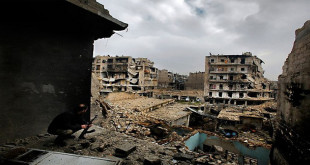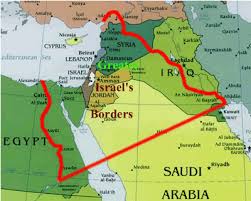 Connecting the dots of recent dramatic events in Bahrain spells one unmistakable message — the US-backed Al Khalifa regime is on the political ropes. It is desperately trying to defeat a determined pro-democracy movement that just won’t lie down or go away.
Connecting the dots of recent dramatic events in Bahrain spells one unmistakable message — the US-backed Al Khalifa regime is on the political ropes. It is desperately trying to defeat a determined pro-democracy movement that just won’t lie down or go away.
The regime is fighting for its very survival under unrelenting pressure from the mainly Shia population, who won’t back down in their demand for human dignity and freedom, no matter how much they are brutalized and terrorized.
But it’s not just the survival of the Khalifa regime that is at stake. It’s the entire US-backed order of Arab monarchies which has been in place for over six decades, and which is now showing cracks in the dam. This order has historically guaranteed the West a reliable source of oil; and more recently it is crucial to shoring up the bankrupt petrodollar system that Anglo-American global capitalism depends on.
Moreover, the Persian Gulf Arab dictatorships are a lucrative destination for the American and British weapons industries. The latter vital interest was underscored last week by the visit of British prime minister to the United Arab Emirates and Saudi Arabia — whose sole mission was to sell $9 billion-worth of fighter jets to these regimes. The Pentagon is also planning to sell Saudi Arabia $6.7 billion-worth of military transport planes, on top of the $60 billion deal signed off last year. In an age of debt-ridden American and British capitalism, the Arab dictators are vital sources of cash.
This crucial geo-strategic backdrop to Bahrain explains the escalating repression in the tiny island kingdom against civilian protesters, with a blanket ban invoked by the regime on all public demonstrations. Bloggers and organisers caught or suspected of agitating on social media have been dealt with instant imprisonment.
Then last week saw the rulers making the extraordinary Orwellian move of deleting the nationality status of 31 Bahraini pro-democracy leaders — a move that has shocked human rights observers and which contravenes the UN Universal Declaration of Human Rights. Imagine a government making its own citizens “non-nationals.” How sinister is that?
Those draconian moves followed on the heels of suspicious explosions in the capital, Manama, and earlier last month in the village of Eker, which claimed the lives of two Indian workers and a policeman, respectively.
This theatre of dirty tricks and playing to the gallery with lurid accusations of foreign subversion is, to be sure, aimed at justifying the unjustifiable — the use of state terrorism and repression against civilians who are simply demanding basic democratic rights. However, what the latest draconian moves by the Khalifa dictatorship tells us is that the regime and its powerful backers are coming under acute pressure for political survival.
The Western-backed Bahraini monarchy has been facing continuous street protests over the past 21 months — since February 2011 — calling for an elected government to replace decades of misrule and corruption under one family. While the self-styled royal rulers and their hangers-on live in absolute luxury — never having worked a day in their pampered lives — the majority of Bahrainis live in poverty and under constant harassment from regime goons and death squads hired from neighbouring Sunni countries, such as Yemen and Pakistan.
Bahrain’s mainly Shia population wants the Al Khalifa regime, headed by King Hamad, to be abolished — and quite rightly so. The regime is seen as an imposter, originally from the Arabian Peninsula, which was installed by the British Empire to rule over Bahrainis in order to make the territory and Persian Gulf waterway safe for Britain’s geopolitical interests. This function of the Khalifa as a foreign proxy still persists for American and British interests.
Over the past two years, largely peaceful demonstrations have been held nearly on a daily basis across the oil-rich Persian Gulf island, despite a brutal crackdown by regime forces that has caused some 100 deaths since the uprising.
Two factors underpin the Al Khalifa’s shaky hold on power. First, massive support from neighbouring Persian Gulf monarchies led primarily by Saudi Arabia. These unelected Sunni kings and emirs have bankrolled their smaller neighbour since protests have taken a heavy toll on the economy and investor confidence. Saudi Arabia — the world’s biggest oil exporter — has also sent troops into Bahrain, which have greatly intensified the repression against the Bahraini population and shored up the Khalifa regime with a reign of terror.
Secondly, Bahrain’s monarchy has been able to rely on unwavering diplomatic and military support from the United States and British governments. Apart from the occasional muted words of concern about human rights, Washington and London’s repeated salutations of “key ally” and flow of weapon sales have, in effect, told the Bahraini and Saudi regimes that they have a green light to crush the popular revolt by whatever means necessary. The unquestioned stationing of the US Navy’s Fifth Fleet in Bahrain is perhaps the clearest signal from Washington that its patronage to the Khalifa regime is rock solid.
Also the dearth of reportage in the Western media on state violence in Bahrain not only reflects the commitment of Washington and London to the Bahraini regime, but the lack of media coverage has served to stymie Western public disquiet over what are ongoing crimes against humanity by Western-backed regimes.
Nevertheless, the formidable external support for the Bahraini regime’s repression has not deterred the people from persisting in their demands for democratic freedom. It is testimony to the Bahraini people that despite immense state terrorism and violations, shooting of demonstrators, firing toxic gas into homes, imprisonment of thousands by military courts, illegal detention and torture, persecution in workplaces — despite all these crimes, the people have remained steadfast in their demands.
This tenacity of the people in the face of unrelenting brutality has not only infuriated the Khalifa regime. It is seen as deeply alarming for its grip on power. The regime has exhausted every means of repression and yet the people are still coming out on to the streets calling for its downfall and replacement with elected government.
More significantly, the persistence of the pro-democracy movement in Bahrain is even more alarming for the backers of the regime. The urgency with which Saudi Arabia and the other Persian Gulf sheikhdoms sent troops to Bahrain last year betrayed the deep apprehensions of these monarchs to extinguish the Arab revolt that had spread from the Middle East and North Africa into the Persian Gulf. After all, these monarchies rule over their populations with absolute despotic control; they are all marked by severe restrictions on freedom of expression and intolerance of any dissent. Any such backward, obscurantist domination of populations is always ripe for overthrow, and especially in an age of global communications.
From the Arab rulers’ point of view, Bahrain’s popular uprising represents an extremely dangerous development, not just towards the status quo of the Khalifas, but to the whole monarchial system in the Persian Gulf. Bahrain itself is a tiny player among the Persian Gulf monarchies. But like a house of cards, the entire edifice of monarchial rule in the Persian Gulf is only as strong as its weakest member.
A successful pro-democracy movement in Bahrain that casts aside an indolent corrupt elite would have an electrifying effect on the populations in the other Persian Gulf monarchies. Such a development in Bahrain would be truly revolutionary. Imagine freedom of expression, independent media and judiciary, and elected government to harness the oil and gas wealth of these countries for democratic social development. Saudi Arabia, with its high levels of youth unemployment and widespread poverty, is particularly ripe for radical change. Indeed, in spite of the lack of Western media coverage, Saudi Arabia has been rocked by increasing pro-democracy protests that are spreading beyond the restive Shia Eastern Province to other parts of the kingdom, including the capital Riyadh and the Red Sea port city of Jeddah. Protesters in Saudi Arabia explicitly chant slogans in solidarity with those of Bahrain.
For the second week running, Kuwait is witnessing the biggest protests ever against the al-Sabah monarchy. In the UAE, the authorities are cracking down on dissent, with several of its nationals detained or denied citizenships.
In this volatile political climate, Bahrain’s pro-democracy uprising represents a deadly threat to all the incumbent Persian Gulf rulers.
The Western powers are keenly aware of this danger. The danger is not just to the mere existence of pro-Western Arab monarchs. Their continuing hold on power is bound up with the continuance of the Western dominance of the global economy. Saudi Arabia is among the top three oil suppliers to the US. Some 17-20 percent of the US daily oil consumption comes from the Arab sheikhdoms in the Persian Gulf. The strategic alliance between the US and these Arab dictators also relies on the latter’s commitment to trade oil exclusively in US dollars and to recycle their petrodollars into American treasuries and assets, as well as buying up billions of dollars worth of Western weaponry. In an age of waning Western industrial economies, the arms trade has assumed even greater importance.
Without this Persian Gulf Arab subservience, the Anglo-American global financial system would promptly collapse.
A more democratic, independent Persian Gulf region would not only deal a mortal blow to American and British global capitalism, it would also very probably lead to more balanced cordial relations among regional countries with Iran. Iranian influence and stature in this geo-strategically crucial region would grow even more, for all good and positive reasons. And that would be the final nail in the coffin for Washington and London’s geopolitical machinations, in particular the depredations of the criminal Israeli Zionist state.
For all these deep reasons, that is why the repression in Bahrain is being stepped up with the connivance of Washington, London and the other Persian Gulf monarchies. But the more the repression is stepped up, the more it signifies that the US and British-backed despotic monarchies are on the ropes and under increasing threat of internal social implosion.
Finian Cunningham (born 1963) has written extensively on international affairs, with articles published in several languages. He is a Master’s graduate in Agricultural Chemistry and worked as a scientific editor for the Royal Society of Chemistry, Cambridge, England, before pursuing a career in journalism. He is also a musician and songwriter. The author and media commentator was expelled from Bahrain in June 2011 for his critical journalism in which he highlighted human rights violations by the Western-backed regime.
This article was originally posted at Press TV
 Sri lanka Muslims Web Portal Diversity and Inclusiveness
Sri lanka Muslims Web Portal Diversity and Inclusiveness



